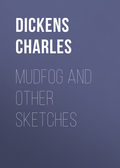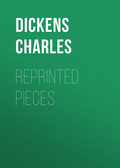
Чарльз Диккенс
Sketches by Boz, Illustrative of Every-Day Life and Every-Day People
CHAPTER III – SHOPS AND THEIR TENANTS
What inexhaustible food for speculation, do the streets of London afford! We never were able to agree with Sterne in pitying the man who could travel from Dan to Beersheba, and say that all was barren; we have not the slightest commiseration for the man who can take up his hat and stick, and walk from Covent-garden to St. Paul’s Churchyard, and back into the bargain, without deriving some amusement – we had almost said instruction – from his perambulation. And yet there are such beings: we meet them every day. Large black stocks and light waistcoats, jet canes and discontented countenances, are the characteristics of the race; other people brush quickly by you, steadily plodding on to business, or cheerfully running after pleasure. These men linger listlessly past, looking as happy and animated as a policeman on duty. Nothing seems to make an impression on their minds: nothing short of being knocked down by a porter, or run over by a cab, will disturb their equanimity. You will meet them on a fine day in any of the leading thoroughfares: peep through the window of a west-end cigar shop in the evening, if you can manage to get a glimpse between the blue curtains which intercept the vulgar gaze, and you see them in their only enjoyment of existence. There they are lounging about, on round tubs and pipe boxes, in all the dignity of whiskers, and gilt watch-guards; whispering soft nothings to the young lady in amber, with the large ear-rings, who, as she sits behind the counter in a blaze of adoration and gas-light, is the admiration of all the female servants in the neighbourhood, and the envy of every milliner’s apprentice within two miles round.
One of our principal amusements is to watch the gradual progress – the rise or fall – of particular shops. We have formed an intimate acquaintance with several, in different parts of town, and are perfectly acquainted with their whole history. We could name off-hand, twenty at least, which we are quite sure have paid no taxes for the last six years. They are never inhabited for more than two months consecutively, and, we verily believe, have witnessed every retail trade in the directory.
There is one, whose history is a sample of the rest, in whose fate we have taken especial interest, having had the pleasure of knowing it ever since it has been a shop. It is on the Surrey side of the water – a little distance beyond the Marsh-gate. It was originally a substantial, good-looking private house enough; the landlord got into difficulties, the house got into Chancery, the tenant went away, and the house went to ruin. At this period our acquaintance with it commenced; the paint was all worn off; the windows were broken, the area was green with neglect and the overflowings of the water-butt; the butt itself was without a lid, and the street-door was the very picture of misery. The chief pastime of the children in the vicinity had been to assemble in a body on the steps, and to take it in turn to knock loud double knocks at the door, to the great satisfaction of the neighbours generally, and especially of the nervous old lady next door but one. Numerous complaints were made, and several small basins of water discharged over the offenders, but without effect. In this state of things, the marine-store dealer at the corner of the street, in the most obliging manner took the knocker off, and sold it: and the unfortunate house looked more wretched than ever.
We deserted our friend for a few weeks. What was our surprise, on our return, to find no trace of its existence! In its place was a handsome shop, fast approaching to a state of completion, and on the shutters were large bills, informing the public that it would shortly be opened with ‘an extensive stock of linen-drapery and haberdashery.’ It opened in due course; there was the name of the proprietor ‘and Co.’ in gilt letters, almost too dazzling to look at. Such ribbons and shawls! and two such elegant young men behind the counter, each in a clean collar and white neckcloth, like the lover in a farce. As to the proprietor, he did nothing but walk up and down the shop, and hand seats to the ladies, and hold important conversations with the handsomest of the young men, who was shrewdly suspected by the neighbours to be the ‘Co.’ We saw all this with sorrow; we felt a fatal presentiment that the shop was doomed – and so it was. Its decay was slow, but sure. Tickets gradually appeared in the windows; then rolls of flannel, with labels on them, were stuck outside the door; then a bill was pasted on the street-door, intimating that the first floor was to let unfurnished; then one of the young men disappeared altogether, and the other took to a black neckerchief, and the proprietor took to drinking. The shop became dirty, broken panes of glass remained unmended, and the stock disappeared piecemeal. At last the company’s man came to cut off the water, and then the linen-draper cut off himself, leaving the landlord his compliments and the key.
The next occupant was a fancy stationer. The shop was more modestly painted than before, still it was neat; but somehow we always thought, as we passed, that it looked like a poor and struggling concern. We wished the man well, but we trembled for his success. He was a widower evidently, and had employment elsewhere, for he passed us every morning on his road to the city. The business was carried on by his eldest daughter. Poor girl! she needed no assistance. We occasionally caught a glimpse of two or three children, in mourning like herself, as they sat in the little parlour behind the shop; and we never passed at night without seeing the eldest girl at work, either for them, or in making some elegant little trifle for sale. We often thought, as her pale face looked more sad and pensive in the dim candle-light, that if those thoughtless females who interfere with the miserable market of poor creatures such as these, knew but one-half of the misery they suffer, and the bitter privations they endure, in their honourable attempts to earn a scanty subsistence, they would, perhaps, resign even opportunities for the gratification of vanity, and an immodest love of self-display, rather than drive them to a last dreadful resource, which it would shock the delicate feelings of these charitable ladies to hear named.
But we are forgetting the shop. Well, we continued to watch it, and every day showed too clearly the increasing poverty of its inmates. The children were clean, it is true, but their clothes were threadbare and shabby; no tenant had been procured for the upper part of the house, from the letting of which, a portion of the means of paying the rent was to have been derived, and a slow, wasting consumption prevented the eldest girl from continuing her exertions. Quarter-day arrived. The landlord had suffered from the extravagance of his last tenant, and he had no compassion for the struggles of his successor; he put in an execution. As we passed one morning, the broker’s men were removing the little furniture there was in the house, and a newly-posted bill informed us it was again ‘To Let.’ What became of the last tenant we never could learn; we believe the girl is past all suffering, and beyond all sorrow. God help her! We hope she is.
We were somewhat curious to ascertain what would be the next stage – for that the place had no chance of succeeding now, was perfectly clear. The bill was soon taken down, and some alterations were being made in the interior of the shop. We were in a fever of expectation; we exhausted conjecture – we imagined all possible trades, none of which were perfectly reconcilable with our idea of the gradual decay of the tenement. It opened, and we wondered why we had not guessed at the real state of the case before. The shop – not a large one at the best of times – had been converted into two: one was a bonnet-shape maker’s, the other was opened by a tobacconist, who also dealt in walking-sticks and Sunday newspapers; the two were separated by a thin partition, covered with tawdry striped paper.
The tobacconist remained in possession longer than any tenant within our recollection. He was a red-faced, impudent, good-for-nothing dog, evidently accustomed to take things as they came, and to make the best of a bad job. He sold as many cigars as he could, and smoked the rest. He occupied the shop as long as he could make peace with the landlord, and when he could no longer live in quiet, he very coolly locked the door, and bolted himself. From this period, the two little dens have undergone innumerable changes. The tobacconist was succeeded by a theatrical hair-dresser, who ornamented the window with a great variety of ‘characters,’ and terrific combats. The bonnet-shape maker gave place to a greengrocer, and the histrionic barber was succeeded, in his turn, by a tailor. So numerous have been the changes, that we have of late done little more than mark the peculiar but certain indications of a house being poorly inhabited. It has been progressing by almost imperceptible degrees. The occupiers of the shops have gradually given up room after room, until they have only reserved the little parlour for themselves. First there appeared a brass plate on the private door, with ‘Ladies’ School’ legibly engraved thereon; shortly afterwards we observed a second brass plate, then a bell, and then another bell.
When we paused in front of our old friend, and observed these signs of poverty, which are not to be mistaken, we thought as we turned away, that the house had attained its lowest pitch of degradation. We were wrong. When we last passed it, a ‘dairy’ was established in the area, and a party of melancholy-looking fowls were amusing themselves by running in at the front door, and out at the back one.
CHAPTER IV – SCOTLAND-YARD
Scotland-yard is a small – a very small-tract of land, bounded on one side by the river Thames, on the other by the gardens of Northumberland House: abutting at one end on the bottom of Northumberland-street, at the other on the back of Whitehall-place. When this territory was first accidentally discovered by a country gentleman who lost his way in the Strand, some years ago, the original settlers were found to be a tailor, a publican, two eating-house keepers, and a fruit-pie maker; and it was also found to contain a race of strong and bulky men, who repaired to the wharfs in Scotland-yard regularly every morning, about five or six o’clock, to fill heavy waggons with coal, with which they proceeded to distant places up the country, and supplied the inhabitants with fuel. When they had emptied their waggons, they again returned for a fresh supply; and this trade was continued throughout the year.
As the settlers derived their subsistence from ministering to the wants of these primitive traders, the articles exposed for sale, and the places where they were sold, bore strong outward marks of being expressly adapted to their tastes and wishes. The tailor displayed in his window a Lilliputian pair of leather gaiters, and a diminutive round frock, while each doorpost was appropriately garnished with a model of a coal-sack. The two eating-house keepers exhibited joints of a magnitude, and puddings of a solidity, which coalheavers alone could appreciate; and the fruit-pie maker displayed on his well-scrubbed window-board large white compositions of flour and dripping, ornamented with pink stains, giving rich promise of the fruit within, which made their huge mouths water, as they lingered past.
But the choicest spot in all Scotland-yard was the old public-house in the corner. Here, in a dark wainscoted-room of ancient appearance, cheered by the glow of a mighty fire, and decorated with an enormous clock, whereof the face was white, and the figures black, sat the lusty coalheavers, quaffing large draughts of Barclay’s best, and puffing forth volumes of smoke, which wreathed heavily above their heads, and involved the room in a thick dark cloud. From this apartment might their voices be heard on a winter’s night, penetrating to the very bank of the river, as they shouted out some sturdy chorus, or roared forth the burden of a popular song; dwelling upon the last few words with a strength and length of emphasis which made the very roof tremble above them.
Here, too, would they tell old legends of what the Thames was in ancient times, when the Patent Shot Manufactory wasn’t built, and Waterloo-bridge had never been thought of; and then they would shake their heads with portentous looks, to the deep edification of the rising generation of heavers, who crowded round them, and wondered where all this would end; whereat the tailor would take his pipe solemnly from his mouth, and say, how that he hoped it might end well, but he very much doubted whether it would or not, and couldn’t rightly tell what to make of it – a mysterious expression of opinion, delivered with a semi-prophetic air, which never failed to elicit the fullest concurrence of the assembled company; and so they would go on drinking and wondering till ten o’clock came, and with it the tailor’s wife to fetch him home, when the little party broke up, to meet again in the same room, and say and do precisely the same things, on the following evening at the same hour.
About this time the barges that came up the river began to bring vague rumours to Scotland-yard of somebody in the city having been heard to say, that the Lord Mayor had threatened in so many words to pull down the old London-bridge, and build up a new one. At first these rumours were disregarded as idle tales, wholly destitute of foundation, for nobody in Scotland-yard doubted that if the Lord Mayor contemplated any such dark design, he would just be clapped up in the Tower for a week or two, and then killed off for high treason.
By degrees, however, the reports grew stronger, and more frequent, and at last a barge, laden with numerous chaldrons of the best Wallsend, brought up the positive intelligence that several of the arches of the old bridge were stopped, and that preparations were actually in progress for constructing the new one. What an excitement was visible in the old tap-room on that memorable night! Each man looked into his neighbour’s face, pale with alarm and astonishment, and read therein an echo of the sentiments which filled his own breast. The oldest heaver present proved to demonstration, that the moment the piers were removed, all the water in the Thames would run clean off, and leave a dry gully in its place. What was to become of the coal-barges – of the trade of Scotland-yard – of the very existence of its population? The tailor shook his head more sagely than usual, and grimly pointing to a knife on the table, bid them wait and see what happened. He said nothing – not he; but if the Lord Mayor didn’t fall a victim to popular indignation, why he would be rather astonished; that was all.
They did wait; barge after barge arrived, and still no tidings of the assassination of the Lord Mayor. The first stone was laid: it was done by a Duke – the King’s brother. Years passed away, and the bridge was opened by the King himself. In course of time, the piers were removed; and when the people in Scotland-yard got up next morning in the confident expectation of being able to step over to Pedlar’s Acre without wetting the soles of their shoes, they found to their unspeakable astonishment that the water was just where it used to be.
A result so different from that which they had anticipated from this first improvement, produced its full effect upon the inhabitants of Scotland-yard. One of the eating-house keepers began to court public opinion, and to look for customers among a new class of people. He covered his little dining-tables with white cloths, and got a painter’s apprentice to inscribe something about hot joints from twelve to two, in one of the little panes of his shop-window. Improvement began to march with rapid strides to the very threshold of Scotland-yard. A new market sprung up at Hungerford, and the Police Commissioners established their office in Whitehall-place. The traffic in Scotland-yard increased; fresh Members were added to the House of Commons, the Metropolitan Representatives found it a near cut, and many other foot passengers followed their example.
We marked the advance of civilisation, and beheld it with a sigh. The eating-house keeper who manfully resisted the innovation of table-cloths, was losing ground every day, as his opponent gained it, and a deadly feud sprung up between them. The genteel one no longer took his evening’s pint in Scotland-yard, but drank gin and water at a ‘parlour’ in Parliament-street. The fruit-pie maker still continued to visit the old room, but he took to smoking cigars, and began to call himself a pastrycook, and to read the papers. The old heavers still assembled round the ancient fireplace, but their talk was mournful: and the loud song and the joyous shout were heard no more.
And what is Scotland-yard now? How have its old customs changed; and how has the ancient simplicity of its inhabitants faded away! The old tottering public-house is converted into a spacious and lofty ‘wine-vaults;’ gold leaf has been used in the construction of the letters which emblazon its exterior, and the poet’s art has been called into requisition, to intimate that if you drink a certain description of ale, you must hold fast by the rail. The tailor exhibits in his window the pattern of a foreign-looking brown surtout, with silk buttons, a fur collar, and fur cuffs. He wears a stripe down the outside of each leg of his trousers: and we have detected his assistants (for he has assistants now) in the act of sitting on the shop-board in the same uniform.
At the other end of the little row of houses a boot-maker has established himself in a brick box, with the additional innovation of a first floor; and here he exposes for sale, boots – real Wellington boots – an article which a few years ago, none of the original inhabitants had ever seen or heard of. It was but the other day, that a dress-maker opened another little box in the middle of the row; and, when we thought that the spirit of change could produce no alteration beyond that, a jeweller appeared, and not content with exposing gilt rings and copper bracelets out of number, put up an announcement, which still sticks in his window, that ‘ladies’ ears may be pierced within.’ The dress-maker employs a young lady who wears pockets in her apron; and the tailor informs the public that gentlemen may have their own materials made up.
Amidst all this change, and restlessness, and innovation, there remains but one old man, who seems to mourn the downfall of this ancient place. He holds no converse with human kind, but, seated on a wooden bench at the angle of the wall which fronts the crossing from Whitehall-place, watches in silence the gambols of his sleek and well-fed dogs. He is the presiding genius of Scotland-yard. Years and years have rolled over his head; but, in fine weather or in foul, hot or cold, wet or dry, hail, rain, or snow, he is still in his accustomed spot. Misery and want are depicted in his countenance; his form is bent by age, his head is grey with length of trial, but there he sits from day to day, brooding over the past; and thither he will continue to drag his feeble limbs, until his eyes have closed upon Scotland-yard, and upon the world together.
A few years hence, and the antiquary of another generation looking into some mouldy record of the strife and passions that agitated the world in these times, may glance his eye over the pages we have just filled: and not all his knowledge of the history of the past, not all his black-letter lore, or his skill in book-collecting, not all the dry studies of a long life, or the dusty volumes that have cost him a fortune, may help him to the whereabouts, either of Scotland-yard, or of any one of the landmarks we have mentioned in describing it.







